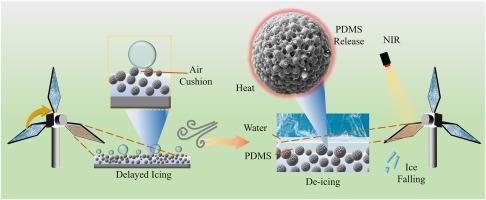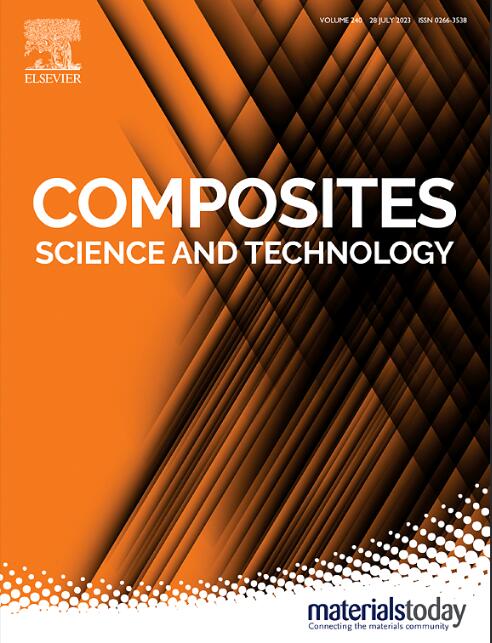A superhydrophobic Fe3O4@MSN-PDMS based composite coating with icephobicity, long-term durability and self-healing property for anti-/de-icing
IF 8.3
1区 材料科学
Q1 MATERIALS SCIENCE, COMPOSITES
引用次数: 0
Abstract
Ice formation is a ubiquitous phenomenon in various fields and often leads to catastrophic consequences. Despite numerous anti-icing coating strategies have been exploited, there are still multiple roadblocks in the way of developing anti-icing coatings with durable and effective anti-/de-icing properties. In this work, Fe3O4 was coated in-situ with mesoporous silica nanoparticle (MSN), in which a high dosage of polydimethylsiloxane (PDMS) was then loaded. As-obtained core-shelled Fe3O4@MSN-PDMS aggregates were incorporated into silicone resin to construct an NIR responsive anti-/de-icing coating via spraying method. The as-prepared coating exhibited superhydrophobicity (156.7° of water contact angle) and delayed icing time to 412 s under −20 °C. Besides, the prepared coating could heat and release PDMS to constitute a PDMS/water double-layer lubricant under NIR irradiation, significantly reducing ice adhesion strength from 90.60 kPa to 12.04 kPa. Furthermore, the prepared coating demonstrates self-healing properties and high durability, releasing PDMS stored in the coating sustainably to heal the damaged coating surface and keeping superhydrophobicity after chemical etching and mechanical erosion. Finally, the de-icing applicability of the coating was validated using a homemade rotor wing model. Such core-shelled anti-/de-icing materials would provide a theoretical basis and a brand-new design strategy for development and application of anti-/de-icing materials.

一种基于 Fe3O4@MSN-PDMS 的超疏水性复合涂层,具有疏冰性、长期耐久性和自愈性,可用于防/除冰
结冰是各行各业普遍存在的现象,往往会导致灾难性后果。尽管人们已经探索出了许多防冰涂层策略,但在开发具有持久、有效的防冰/除冰性能的防冰涂层的道路上仍有许多障碍。在这项工作中,Fe3O4 与介孔二氧化硅纳米粒子(MSN)进行了原位涂层,然后在其中负载了高剂量的聚二甲基硅氧烷(PDMS)。将获得的核壳 Fe3O4@MSN-PDMS 聚集体加入硅树脂中,通过喷涂方法构建了一种近红外响应型防冰/除冰涂层。所制备的涂层具有超疏水性能(水接触角为 156.7°),在-20 °C条件下可将结冰时间延迟至 412 秒。此外,制备的涂层还能在近红外照射下加热并释放 PDMS,形成 PDMS/ 水双层润滑剂,将冰粘附强度从 90.60 kPa 显著降低到 12.04 kPa。此外,制备的涂层还具有自修复特性和高耐久性,可持续释放涂层中储存的 PDMS 以修复受损涂层表面,并在化学蚀刻和机械侵蚀后保持超疏水性。最后,利用自制的旋翼模型对涂层的除冰适用性进行了验证。这种核壳防除冰材料将为防除冰材料的开发和应用提供理论依据和全新的设计策略。
本文章由计算机程序翻译,如有差异,请以英文原文为准。
求助全文
约1分钟内获得全文
求助全文
来源期刊

Composites Science and Technology
工程技术-材料科学:复合
CiteScore
16.20
自引率
9.90%
发文量
611
审稿时长
33 days
期刊介绍:
Composites Science and Technology publishes refereed original articles on the fundamental and applied science of engineering composites. The focus of this journal is on polymeric matrix composites with reinforcements/fillers ranging from nano- to macro-scale. CSTE encourages manuscripts reporting unique, innovative contributions to the physics, chemistry, materials science and applied mechanics aspects of advanced composites.
Besides traditional fiber reinforced composites, novel composites with significant potential for engineering applications are encouraged.
 求助内容:
求助内容: 应助结果提醒方式:
应助结果提醒方式:


